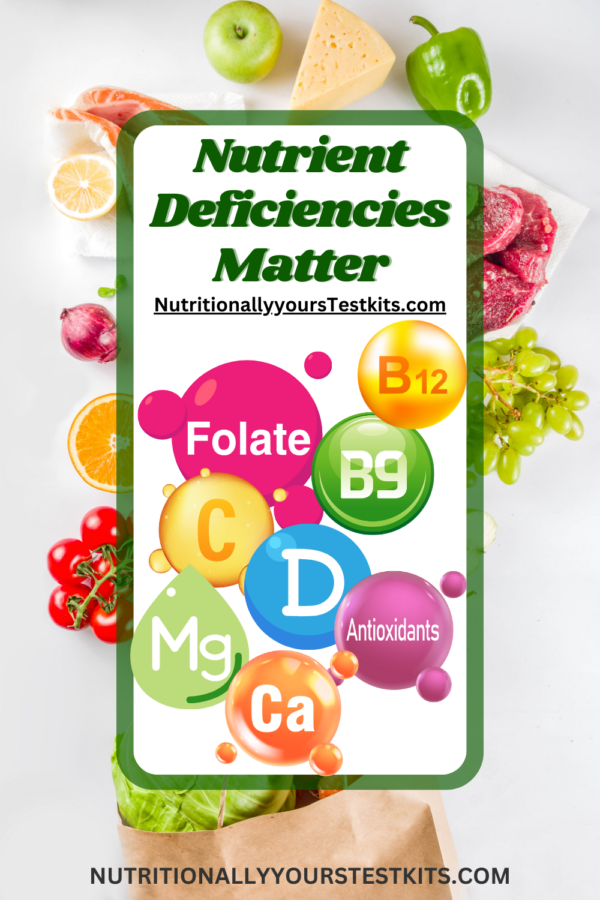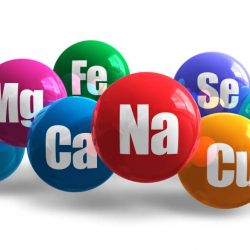Nutrient Deficiency Test
get a free analysis and protocol with all test results.
- Personalized Protocols
- Confidential
- Convenient
- Comprehensive
When you understand your lab tests... you understand your health!
Nutrient Deficiency Test
Testing for nutrient deficiencies is crucial when you are concerned about proper nutrition, taking the right vitamins and minerals, and optimal health and well-being. Despite our best efforts to eat a proper diet, several factors, such as genetics, stress, and underlying health conditions, can affect our body’s ability to absorb and utilize essential nutrients effectively.
By identifying nutritional deficiencies through comprehensive blood testing, you will gain valuable insights into your nutritional status, and vitamins and minerals, allowing for targeted interventions to address any imbalances. For example, if you are eating healthy and a nutrient deficiency test shows you are low in antioxidants, you would focus your vitamin purchases on the specific antioxidants the test shows you are low in. You can also adjust your daily diet to be higher in antioxidants.
This proactive approach helps prevent potential health issues associated with nutritional deficiencies and enables you to optimize your nutrient intake, supporting overall vitality and quality of life.
Furthermore, a nutrient deficiency test is crucial for people with specific health challenges or dietary restrictions. Whether managing chronic conditions, undergoing certain medical treatments, or following restrictive diets, understanding your nutrient status is essential for informed decision-making and personalized health management.
By pinpointing deficiencies early on, you are taking proactive steps to replenish vital nutrients, supporting your journey toward better health and well-being.

Nutrient deficiencies can occur even in individuals with seemingly healthy diets due to various factors such as poor absorption, genetic predispositions, or underlying health conditions.
What is the Most Common Nutrient Deficiency?
The most common nutrient deficiency I see in my practice is folate or vitamin B9.
Folate or B9 is vital to prevent anemia. Folate is crucial for the methylation process, and the need shows up with MTHFR gene deficiency. Some folate deficiency symptoms include depression, mood swings, or cardiovascular disease.
Some food sources of folate are spinach, eggs, beets, beef liver, beans, sunflower seeds, and any dark green leafy vegetable and citrus fruit.
Taking folic acid is not enough if you are having trouble converting it to the usable form called folate.
How to Test For Nutrient Deficency?

Testing for nutrient deficiency involves a comprehensive approach beyond traditional static blood tests. Instead, opting for an intracellular blood test provides a more accurate assessment of nutrient functionality by examining the white blood cells, where the actual “functionality” of vitamins and minerals resides. Unlike static blood tests, which may only provide a snapshot of nutrient levels in the bloodstream, intracellular testing delves deeper into cellular health, offering insights into how well nutrients are being utilized by the body.
Our facility prioritizes personalized testing experiences, ensuring each person receives tailored assessments and protocols to address their unique nutritional needs.
Upon ordering a nutrient deficiency test, a kit is mailed to you, along with information on a nearby facility where the blood draw can be conducted. While a small fee is associated with the blood draw, the investment is worthwhile for the comprehensive insights gained.
Following the blood draw, test results are emailed to you, with a personalized protocol outlining specific vitamins and minerals your body lacks and targeted recommendations to support your overall health and well-being.
By offering individualized testing and protocols, we empower individuals to take control of their health journey, addressing deficiencies and optimizing nutrient intake for enhanced vitality.
What Nutrient Deficiency Causes Hair Loss?
There are several nutrients that can contribute to hair loss. These are zinc, biotin, calcium, and magnesium. Zinc deficiency may disrupt the hair growth cycle and lead to hair shedding, as zinc is essential for maintaining the health of hair follicles. Zinc is a beauty mineral that helps with all sorts of skin conditions, including acne, eczema, poor wound healing, and more.
Similarly, biotin, or vitamin B7, promotes healthy hair growth and prevents hair loss. A biotin deficiency can result in brittle hair and increased hair fall.
While calcium and magnesium are associated with bone health, their deficiency can also impact your hair and lead to hair loss. Calcium plays a role in regulating hormone levels, and its deficiency may disrupt hormonal balance, which can contribute to hair shedding. Additionally, magnesium deficiency can hinder scalp circulation and nutrient delivery to hair follicles, affecting their health and leading to increased hair fall.
Testing for nutrient levels in the blood is essential to accurately find deficiencies and address the underlying causes of hair loss. Rather than guessing or assuming which nutrients may be lacking, comprehensive blood testing provides precise insights into your nutrient status. This approach allows targeted supplementation to replenish deficient nutrients and effectively support healthy hair growth. By addressing specific nutrient deficiencies through blood testing, you can take proactive steps to combat hair loss and optimize your overall health and well-being.
ORDER YOUR NUTRIENT DEFICIENCY TEST KIT TODAY!
Save Idea For Later
EXPLORE POPULAR TEST KIT BUNDLES

HAVE A QUESTION? MEET THE OWNER, Alane Wincek!
Certified Holistic Nutritionist, Metabolic Health Specialist, and Naturopath.
I have been working in the field of holistic health and wellness for over 30 years. Nutritionally Yours has a functional medicine medical doctor on staff. Nutritionally Yours offers a wide variety of at-home blood test kits, nutrition test kits at, home health test kits, nutrition, naturopathic, metabolic and weight loss appointments Monday – Friday 9-4 EST.
Our goal and mission is to help our clients get to the root cause of health or weight loss struggles so you can feel healthier, confident, and accomplish more in life.
“I NEED MORE 1-TO-1 HELP”
Virtual Health and Nutrition Counseling
BOOK a virtual health and nutrition appointment today, so we can listen to your health concerns and guide you on the right path to feeling fantastic again.
Let’s get you feeling happier, healthier, confident, energized and feeling amazing.


